
Good lord. Not that the plea deal is a surprise, mind you. The surprise, if there is one, is that it took so long. What's not a surprise is that there is no justice.
We are not supposed to blame soldiers for this kind of shit -- and I have no doubt that this kind of shit was far more common than any American back home is ever likely to know -- because they are just doing their jobs, yadda yadda. That's the problem, though. Their "jobs" include protocols for massacres like Haditha, as well as much else that is practically unmentionable in polite society, not because it is WAR so much as it is utterly conscienceless and morally bankrupt barbarity and depravity that has been drilled into these soldiers to the point where they act as if in a trance, killing and destroying anything and everything that gets in their way or sets them off, triggering a Pavlovian response that they often seem to have no control over at all.
This shit was going on in Iraq so often...
Any resistance was met with extreme violence and brutality, any resistance at all... armed resistance and IEDs were met with slaughter essentially at random. Which led to more resistance, more slaughter, more and more...
And slaughter was met with celebration. The more the slaughter of the innocents the more the celebration.
So here we are, many years down the road, and literally no one at all is held responsible for the many killings of Iraqi civilians. They weren't even counted among the dead for quite a long time; the dead Iraqi civilians didn't even exist as statistics in official reports or the eyes of the troops who so callously killed them.
They were less than non-people.
Let's be clear: the entire Iraq War was a criminal enterprise, all of it, from the get go, from the moment the propaganda drums commenced to beat; and it was based on another criminal enterprise, the First Gulf War, which was based on its own crimes and on the crimes and the lies that preceded it.
Throughout all these crimes and lies dating back decades, hundreds of thousands of people have been murdered, probably millions slaughtered overall, of which two dozen were slaughtered in Haditha, Iraq, in November of 2005.
And, as was so often the case, the truth of what happened as told by the Iraqis was met with a blizzard of lies and propaganda from the military.
But eventually, as happened now and then, the lies fell before the truth, crimes were suspected and charged, and courts-martial were convened, only to lead to dismissals and plea bargains that basically exonerated the troops and their officers and their commanders all the way up the chain to the White House itself.
No one was to blame, too bad so sad, war is hell, oh well!
Got rid of that nasty Saddam for ya, though, didn't we? You're welcome.
Jesus.
Battle for Haditha, 2007
--------------------------------------------------------
These are some testimonies from Haditha and elsewhere in Iraq both before and after the Massacre on November 15, 2005:
Iraqi Doctors Beaten and Arrested in Haditha Hospital----------------------------------------------------------
Sabah Ali (30/10/2005)
Dr. Walid Al-Obeidi, the director of Haditha General Hospital and Dr. Jamil Abdul Jabbar, the only surgeon in the Haditha area were arrested for a week, very badly beaten and threatened to face the same treatment in the future by the American troops.
Dr. Walid said “they arrested me in my house in front of my family, covered my eyes, and tied my hands to the back on Oct 5 2005 morning, during the last attack on Haditha (360 kilometers west of Baghdad). They occupied the hospital for 8 days and made it their office. The first day they beat me on my eyes, nose, back, hands, legs... My face was covered with blood .When they removed the tie I could not see. They investigated me until the afternoon. I realized later that I was arrested in the hospital store. Then they tied my hands to the front, and left me for two days. I was moved then to the pharmacy department. They accused me of treating terrorists, and asked for their names.
I told them that I treat patients regardless of their identity, according to my oath as a doctor; even if they were national guards (which we actually I did) or American soldiers. And any way, if I do not want to treat the insurgents, I have no choice, because they were armed and masked. I would do anything they tell to do. Few days later, one of the soldiers came in the room, did not say anything, kicked me again on my face and left”.
Dr. Jamil, a surgeon for 20 years, was arrested and very badly beaten. When we met him, 22 days later, his face was still blue. His nose was broken, and a big opening in his head: “They beat me on my eyes and nose, kicked me with boots under my chin. One of them threatened me if I do not talk after he counts to three, he would shoot me. He began counting, after three he turned the gun upside down and hit me on the back of my head. For days I could not move or see. They threatened us of abusing our families. For some reason they took my picture while I was bleeding, I could hear the camera click”.
Both doctors were threatened if they do not talk, they would receive the same treatment in the future. They were warned of passing any information of the arrest to the media. They were asked who wrote the hostile slogans against the American on the opposite wall of the hospital? What are the names of the insurgents they treated? and what are the bodies’ pictures in the hospital computer?
Dr.Walid said he does not know who wrote on the wall outside the hospital, what the names of the insurgents are, because they were masked. He explained that the dead bodies’ pictures were of unknown people whose bodies were found after the fighting. “We can not keep these bodies forever; we do not have enough cold boxes. So, after two months, we take their pictures and bury them, so that whenever some one from their families comes to ask we show the pictures of the dead bodies”.
The UN, the international HR organizations, WHO, Doctors sans frontiers…and all who it may concern are called upon to do some thing to help these, and other Iraqi doctors, and to prevent similar treatment in the future. Dr.Walid and Dr. Jamil believe that they may face the arrest and beating in the future. They demand that the American troops stop occupying the hospital and destroying it every time the attack Haditha. They also believe that the Iraqi authorities are incapable of protecting them.
Alqaim October Massacre: Indiscriminate Killing Zone----------------------------------------------------------------------------Dedicated to the UN, UNSC, and the International Society….
Sabah Ali (05/11/2005)
We had to postpone our trip to Al-Qaim and Haditha several times for 2 weeks. Many times the road was closed because of some military operations. We decided to go to the refugee camps first, be ready to move from there as soon as the road is clear. There were 8100 refugee families now (last time, before Oct 1, they were 7450) distributed on the nearest towns, villages and in the desert. Some of the camps were cut from any kind of relief, especially those which were across the Euphrates, because the American troops bombed all the bridges in Alqaim (3) and Haditha (2). The need now is for thick clothes, especially for children, blankets, and medicines for daily use, apart from food. The new families were those who escaped the latest attack on Alqaim (Oct1) and Haditha (Oct 5) The River’s Gate, as it was called. One of the biggest emergency relief organizations in Iraq now admitted that they can not reach the behind-the-river villages.
Arriving in Alqaim general hospital on Oct 25 afternoon, after being lost on a desert detour for more than 2 hours, and coming from the nearest refugee camp where we listened to different stories of the last attack on Oct 1,2005, we were well prepared to listen to the crowed at the emergency room. A big black banner says that the ambulance driver, Mahmood Chiad, was shot on Oct 1,2005 by the American troops while he was trying to help some injured families.
A young man, H.Khalaf, was lying on a trolley, soaked in blood. He was shot in his genitals by an American sniper while he was going home from the market just across the street. The shot injured his right thigh, his testes, and went out through his left thigh.
“There was nothing, no shooting, no bombing, nothing” a neighbor who brought Khalaf to the hospital said. “We heard the shot, and he was lying there bleeding. We could not reach him. He crawled to the side street for few minutes”. The doctor does not know yet how bad the injury is. The bleeding was still running.
In the ward another young man, Salah Hamid, was shot under the belt too. He was driving his taxi at 10 am on Monday Oct17, 2005 in the market place when he was shot by the American snipers. Salah was so angry that he cried and used obscene words (unacceptable in those areas). His car was completely ruined. The doctor explained that a large part of his intestine had to be cut.
In the doctors’ hall, the windows, the curtains, the walls were covered with bullet shots.
The hospital’s assistant director described how bad and difficult the situation is, the continuous bombing of houses and cars, the snipers who shoot indiscriminately any moving thing (two days ago they killed 6 donkeys), the besieged city, the closed highway “I do not understand why they cut the high way and let families go through the desert, they are searching everything and everybody! Now, on top of everything else, the oxegen tubes are not allowed in the hospital”.
(Municipal hotel destroyed)
The administrative assistant explained the situation in the bombed areas across the river (Euphrates) after the bridges were bombed in the attack “There are many villages: Rumana, Al-Beidha, Al-Ish, Dgheima, Baghooz, Al-rabot….etc where families sought shelter from the bombing. These villages are cut of any kind of help now, and are exposed to regular bombing. There is no doctor or clinic in an area of 110 kilometers along the river. The injured families have to be brought by boats, bleed to death, or die under the rubbles. It is impossible to count the dead, their families bury them on the spot, without any document, and of course no media coverage. Civilians, relatives and neighbors help evacuating those buried under the rubbles. Snipers are still hurting us most. On the Referendum day Oct 15, no one would dare to go out; I would not, even if I was given the post of a president”.
The ambulance driver, Mahmood Chiad, 35, was going to Karabla, to help some injured family during the attack. He was shot and killed by a bullet in the left chest. The ambulance was then hit by a grenade which ripped it in two parts, and burnt it. It was still there, but we could not film in the no man’s land, as they call it. Mahmood left a widow and six children; the oldest of them, Aimen (m), is 10 years old. “The family was not given any compensation or pension” said his colleague Muneer Said “he was very poor, living in a tin extension of a house, his family should be taken care of”.
Early next morning, around 7 am, there was noise and crowd in the hospital. Two cars covered with dust, and few men were standing at the emergency gate. One old man, over 60, was sobbing and talking to the sky, repeating hysterically “please come and see what happened to me”, other men were crying silently.
In the emergency ward, a girl of ten was lying on one trolley, and a young woman on another. They were still conscious. The girl, Yosr Jasim Mohammad Al-Ta’i, 10, (going to 5th grade, as she said proudly), was injured in her feet, back, and right ear, which were covered with blood. She did not know that she is the only survivor of a family of 8. Her father, her mother Ibtisam Thiyab Othman, and five of her brothers and sister were buried dead under the rubbles when the American airplanes bombed Al-Ish village at 2 am that day, Oct 26.2005.
The woman, Sa’diya, 35, was injured in her thigh. She was rapped in a burnt out quilt. Sa’diya was in her uncles’ house. Her house was blown up by the American troops the day before “they took the women and children out, and blow the house, I do not know if they arrested the men or they blow them inside the house. We came to my uncles’ house yesterday, today at 2 am we were bombed again”. Sa’diya was terribly shocked. “I do not know how many people were killed. We were more than 30 in the house. My three uncles, their wives and children, my aunt, and five guests in the diwan (guest room), were killed. I do not know if there are any survivors, I was buried under the wall. I saw my uncle Idan, and two of the children Farooq (m)8, and Ahmad (m) 7, they were dead”. (Sa’diy did not know that Yosr, one of the guests and herself are the only survivors of the many families in that house).
Khalifa Mokhlos the only survivor among the 4 men in the guest room said that the other 4 men were killed when two missiles hit the house. “Jasim M. Mokhlos (30), Idan Abdulla Mosa (52), Awad M.Mosa (45), and Moslem K.Hussein (30) were all killed”.
K., the chief of community council in Al-Risala district, himself handicapped in the Iraqi-Iranian war, was telling us many stories of demolished houses and killed families. We asked to visit some of them. He was hesitant, but then suggested that we only visit those in the relatively safe districts. Alqaim now looks so different from Alqaim we saw 18 months ago in the first major American attack in April 2004. Then it was a city full of life, shops, offices, people, police…there was movement in the street. Now it is a dead city. Fear and suspicion are the kings of the streets.
The first family was of Saggar Hamdan, a Land Cruiser driver who was taking his- and his brother in law’s- families to the Okashat refugee camp 200 kilometers away in the desert at 4 pm on the attack first day. His father explained that” there were 19 women and children in the car when it was shot and burnt by the American troops. Saggar , his wife Khadija, and his 6 children (Ala’(m)10, Adil (m), Omar(m), Sheima’(f), Lamia(f)’, and a baby) and his niece were killed. No one was allowed to approach the car until it was no more than ashes”. It was only after 5 days that a cousin, Hashim Hamid, was allowed to get the bodies.
“I had to jeopardize my life, hold a white flag and stand in the American convoy way” Hashim said. “I told them that I wanted the bodies of my cousin and his family. The American Commander said “ I am sorry, it was a mistake, we did not know that it was a family”, and he gave me a plastic sac full of the charred bodies.
………….
The second family was of Mohammad Jabir, a boy of nine years who was shot by an American sniper at his house door in the “Death Street” on Thursday Oct 20, 2005.
“He was going to his uncles’ house, across the street in the railway houses” his father said, trying hard to hold his tears “They were 4 of my children, went out to visit their uncle’s family, they were shot at immediately. They returned back, Mohammad was putting his hand on his chest, said I am injured, and then fell to the ground. He was bleeding. We tried to save him, but no ambulance or car was allowed to pass through. His uncle did not mind the shooting; he drove his car and took us to the hospital. By then Mohammad was dead”.
The mother was heavily covered with black: “when we tried to take him to the hospital, the soldiers shot at us. I was shouting, but no one dared to approach. We sat on the ground waiting for the shooting to stop, until his uncle came with the car”
Mohammad is the 13th child killed by a sniper in the railway houses “they call it the Death Street, one of the children who were killed was only 1.5 years, another was 3. I can take you to visit their families all. On October 23, 2005, at 2 pm, the American airplane was going and coming back many times on the street shooting all the time”. Jabir left his house and is now living in the family’s big house with other 5 families in another area.
……….
The third family was of Attiya Mikhlif. The house was no more than a heap of rubbles. It was bombed at 6 am on August 30, 2005. There was no one of the family left to tell the story. Neighbors were hesitant to talk. “The old man died years ago” one of the neighbors volunteered to talk at last. “There was his old wife, Dalla Hardan 55, his three sons, Daham 35, Rashid 25, and Salman 18, and two daughters in law: Rafaah 19 and Kholood 19. Rashid, his bride Rafaah, Salman and his bride Kholood were all newly married”. All of them were killed that morning.
-“why do you think the house was bombed?”
- “Who knows, the Americans say that there were insurgents in the house, but they were families as you see. And anyway, you do not air bomb houses to kill insurgents who are supposed to be in!!”
………..
The fourth family was of Kawan Abu Mohammad. On September 8, 2005, the house in an agricultural area called the Senjaq was bombed killing 11 civilians, most of them children. The old man, Kawan 70, his son Mohammad 50, a teacher of physics, his daughter in law Hamdiya 40 (Mohammad’s wife), and their 4 children: Dhoha 16(f), Ro’a 10(f), Obeida 12(m), and Hotheifa 4 (m)were all killed under the rubles. Khalid, 18, Kawan’s grandson whose uncle Mohammad was helping him in physics, Amjad(m) 22, Zeinab 17(f), and Saja 8 (f)were all Kawan’s grandchildren, who were visiting their grandfather were all killed in that bombing too. Two members of the family survived: Mahmood Kawan 25(m) was paralyzed and Nahida 16, Amjad’s sister was mildly injured.
K., of the community council, took us then to Al-Risala district where 8 houses were bombed together on Saturday 22, 2005 around 3 am, and the Big Mosque on 23rd . Fortunately, they were empty. “The Americans believe that the insurgents hide in these empty houses” K. explained. Many families returned from the refugee camps to find their houses destroyed.
In
one of the houses in Al-Salaam district, Alwan Abdul Kareem refused to stay with his family in the refugee camp in Anah. He found it unbearable to live as a refugee, so he returned home alone 4 days later. The house was bombed on the same day (Oct 22), he was killed under the heavy stairs where he was hiding, eating his sohoor (the last meal before fasting). Alwan was 58, a gardener and a school guard. We met his family in Anah refugee camp. He left a wife Shokriya, 40, and eight children.
In Anah refugee camp 5 families (around 10 each) lived in one house. They did not receive the monthly food ration for 3 months. K., very anxious to show us how bad the damage was, could not keep his promise of staying away from the dangerous areas. Near the railway station, a completely damaged hotel was used by the municipality to host the very poor families for a symbolic price. So is the railway itself.
Shawkat A. Abbood, who just arrived from Alqaim, told us about the attack on Si'da, a village 10 kilometers to the east, said that on October 1, the market place was closed at 10 am, the city was besieged from two remaining places: Si’da and Karabla, 10 kilometers away. The electricity and phones were cut, all offices were closed, and cars were prevented from moving … “When the bombing began, we remained at home. Translators in military vehicles told the people through megaphones to stay at home, that their lives would be in danger if they move out. We could hear the bombing, but we did not know where exactly. The bombing continued for 4 days. Airplanes were roaming 24 hours; the intensive bombing was at night. In the Rumana village they bombed 4 houses. There were 12 injured the first day. We do not know exactly about the dead, may be 30-40”
-“It was a declared attack, why the families did not leave?”
- “some families do not have any alternative, or too poor to move, some put tents in the farms of the Senjaq area. And any way what was declared was that the American troops are going to enter Alqaim with the Iraqi troops, they called the civilians to cooperate with the troops to arrest the insurgents”. Shawkat’s mother, 55, was crying, listening to her son. She is diabetic, and too frightened “when I hear the bombing, I shiver, feel the pain in my back; I feel the ceiling coming down and crushing me”.
In Alqaim we met A.M. an employee in the electricity office. “We tried 3 times to repair the electricity; the Americans were shooting at us every time. The third time they said you have 30 minutes to repair it. It takes two hours, as you know, on the desert road to reach the station. But we managed to do. The other station is near the customs office (which is now a military base) we could not reach that point”. The same story is repeated with the water.
Shareef, a fireman, and an emergency relief volunteer was very angry “where are the nations of the world, the Moslems, the Arabs…millions of them pray everyday, do not they see what is happening to us”.
Both testimonies are from this link (Index Research)via(The BRusselstribunal.org) where there is much, much more. What was done in Iraq and to Iraq's people by the Americans and under American authority was a monstrous evil, a crime against humanity. The Haditha Massacre was part of a vast murder machine that began long before that incident and lasted long afterwards.
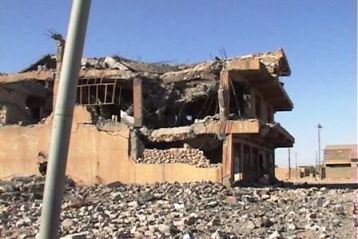

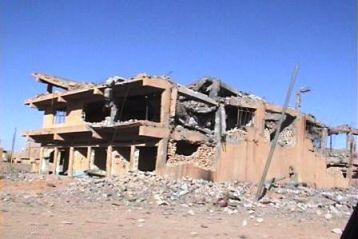
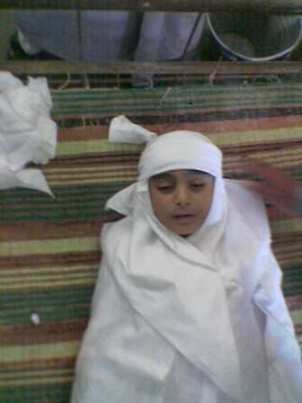
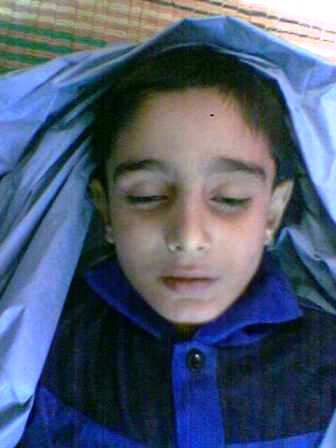
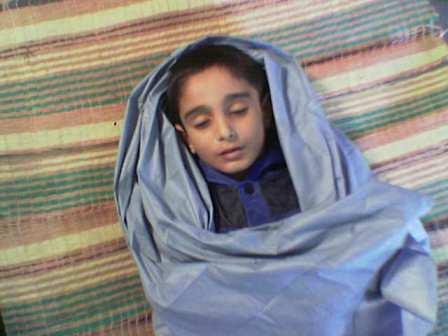
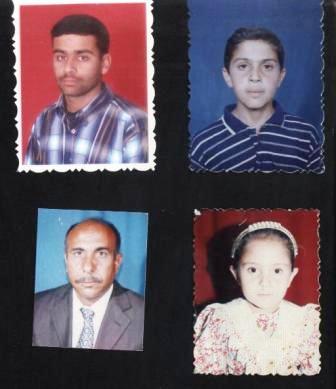
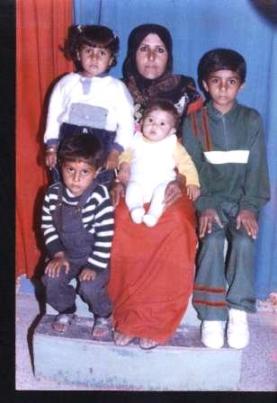
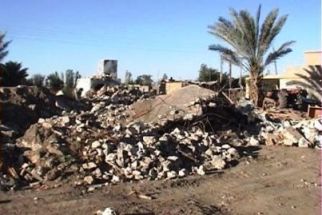

This one was the one that always gets to me:
ReplyDeleteMahmudiyah killings
I used to work with a Laotian American woman who was very gung-ho about the War in Iraq. I never understood how that was possible, but I suppose the media is good at hypnotizing people.
I mean in another era, in another place, she would have been the one raped and murdered by "our boys." But she believed our soldiers were paragons of virtue, and their soldiers were demonic entities. Madness.
More on Abeer Qasim Hamza.
ReplyDeletePretty sure your Laotian colleague was trying to identify with her would-be saviors, in some sense her literal saviors. Certainly Hmong from Laos feel that way.
ReplyDeleteThe Hmong community around here is very strongly pro-American troops. The older ones believe they were saved from annihilation by the Americans, the younger ones seem to be attracted to the glory/glamor of the military and some are eager to volunteer. They aren't so keen on "the government." But that's another story... The surviving Hmong in Laos, I'm told, are still under extreme duress by the descendants of the Pathet Lao.
The barbarity of the American assaults and presence in Iraq will be a story for the ages. Nothing like what the Americans have done to the Iraqi nation and people is paralleled in modern history.
"Even Saddam" was not so bad.
In Iraqi eyes, Americans were just plain evil, the analogs to the way the Poles saw the Nazis.
Nothing like that had happened to them under the Turks or even under the British -- and the British were evil, too. At least the British expressed interest in the history of Mesopotamia and did some archeological exploration and filled the museum in Baghdad with ancient treasures (looted of course when the Americans came...)
No, the barbarity and brutality and sheer mindless cruelty of the Americans wrapped in such total ignorance of where they were and whom they were among will never ever be forgotten in that unhappy land. It remains to be seen whether it will ever be forgiven.
Good god.
ReplyDeleteThat's possible. I did realize that was true with a Vietnamese colleague of mine, but that's mainly because of his constant complaining about his treatment by the communists back home.
ReplyDeleteHis father had some problems with the Homeowners Association, for example, and he would compare them to the communists back home.
So, if you hated the communists, I suppose it would be only natural to identify with their enemies.
I was born in the month that Lieutenant Calley went on trial for My Lai. He's still alive and well, I look up his health every so often online. I confess I don't have good wishes in mind for him...